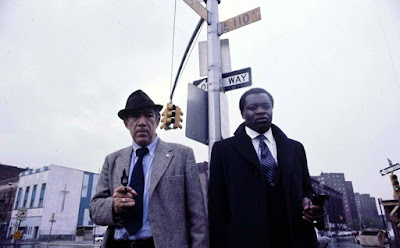Across 110th Street
directed by Barry Shear
directed by Barry Shear
Because of the time and the cast this 1972 film is often lumped in with the "blaxploitation" films of the time. It does have that element but it's just as much a classic heist film and even a noir and action film.
Across 110th Street has a fair amount of explicit and implicit social commentary in its dialogue and cinematography.
I remembered a song performed by Albert King titled "Little Brother (Make A Way)" in which the singer details the negative impacts of racism on his life. As King sings, he had to do things against his will because if he hadn't "little brother" wouldn't have lived. But King is both hopeful and insistent that the "little brother" to whom he is speaking (his son, grandson, or the entire younger generation of Black men) will take advantage of the struggles and sacrifices of the older generation and put things right.
I was reminded of that song watching this movie because the film doesn't pull its punches in examining the fierce institutional and individual racism of whites in authority positions. Usually the Black characters are not in a position to do much about this. Not yet anyway...
So Blacks and Whites on both sides of the law must work together against their adversaries even though they thoroughly despise each other.
The film takes place in seventies Harlem, apparently the worst ghetto in NYC if not the nation. The movie was filmed with mostly handheld cameras. Across 110th Street was visually dark and used mostly real exterior and interior shots.
Harlem is impoverished. The working class doesn't make much money. Many people are unemployed.
Rich slumlords vacation in Florida or Hawaii while their tenants endure non-working toilets, sewage backup in kitchen sinks, and non-functional lighting and heat.
There are two societal organizations that take a great deal of interest in Harlem. One is the Mafia, which sees Harlem as profitable staging grounds for its prostitution, drug, and gambling rackets. The other is the NYPD, whose officers make few distinctions between law abiding Black people and "n******". Beat em up, arrest them all, and let the courts figure out who did what.
Three Black men disguised as police officers have robbed a Mafia gambling book of over $300,000. They have also murdered some White Mafia members, some Black associates, and for good measure two police officers (one Black , one White). The lead robber Jim Harris (Paul Benjamin) is an ex-con with no prospects. Jim is tired of the poorly paid demeaning jobs (janitor, bus boy, car wash employee) that are all a Black ex-con can hope to get.
Jim wants a better life for his girlfriend Gloria (Norma Donaldson), who suffers sexual harassment at her nightclub job.
Bigoted NYPD Captain Frank Mattelli (Anthony Quinn, who also produced) expects to lead the investigation.
Harlem is Mattelli's beat. Mattelli knows the locals..
Mattelli learns that (the lower ranking and Black) Lieutenant William Pope (Yaphet Kotto) has been assigned the case.
The brass thinks Mattelli is getting too old. Also for political reasons the police bigshots want a Black face visible. If things goes wrong then Pope's career is done. If Pope succeeds, police officers who call him a "dumb n******" will take credit for promoting him.
Mattelli hates taking direction from Pope but orders are orders. Pope and Mattelli immediately dislike each other. Pope is sensitive to challenges to his authority, especially from racists.
The Mafia sends Nick D'Salvio (Anthony Franciosa) to find, punish, and kill the robbers. The Black Harlem hoodlum boss, Doc Johnson (Richard Ward) and his men must work with Nick.
But while Mattelli can temporarily tamp down his racism, Nick wants every Black person within 100 yards to know just how much contempt and hatred he has for them. This very much includes Doc. Doc and Nick have bad history.
The squabbling competing teams of police and gangsters close the net around Jim and his compatriots.
But whereas Jim's confederates wanted money or women, Jim was motivated by pride. Jim's not going back to prison. Jim knows that neither Mafia goons nor police are bulletproof.
Kotto impresses as an intense Black man who demands respect even as he must work with stone cold racists. The special effects are so-so but if you're looking for seventies era griminess then this isn't a bad film. It has the right mix of suspense and action. Antonio Fargas appears as a robber whose lust is greater than his wisdom. It seems like that was his usual role in most of his movies.



